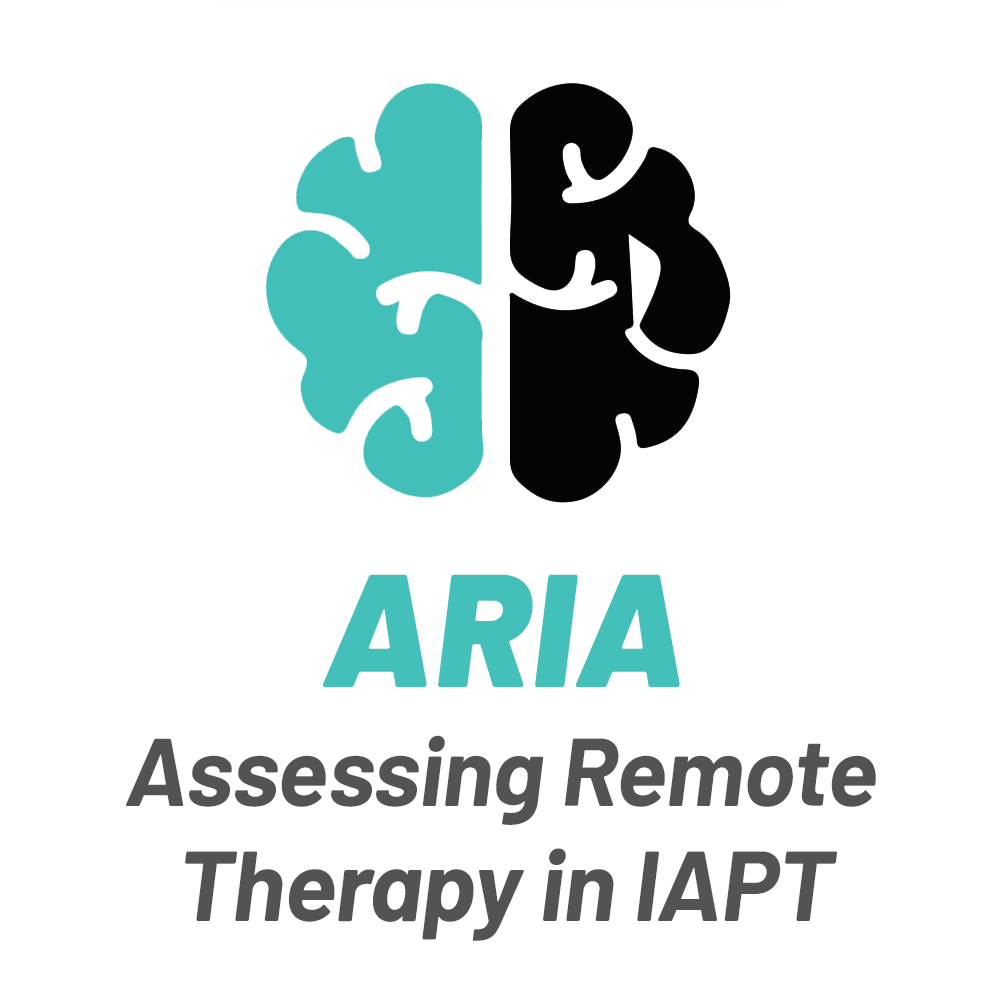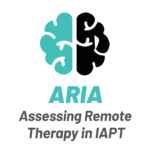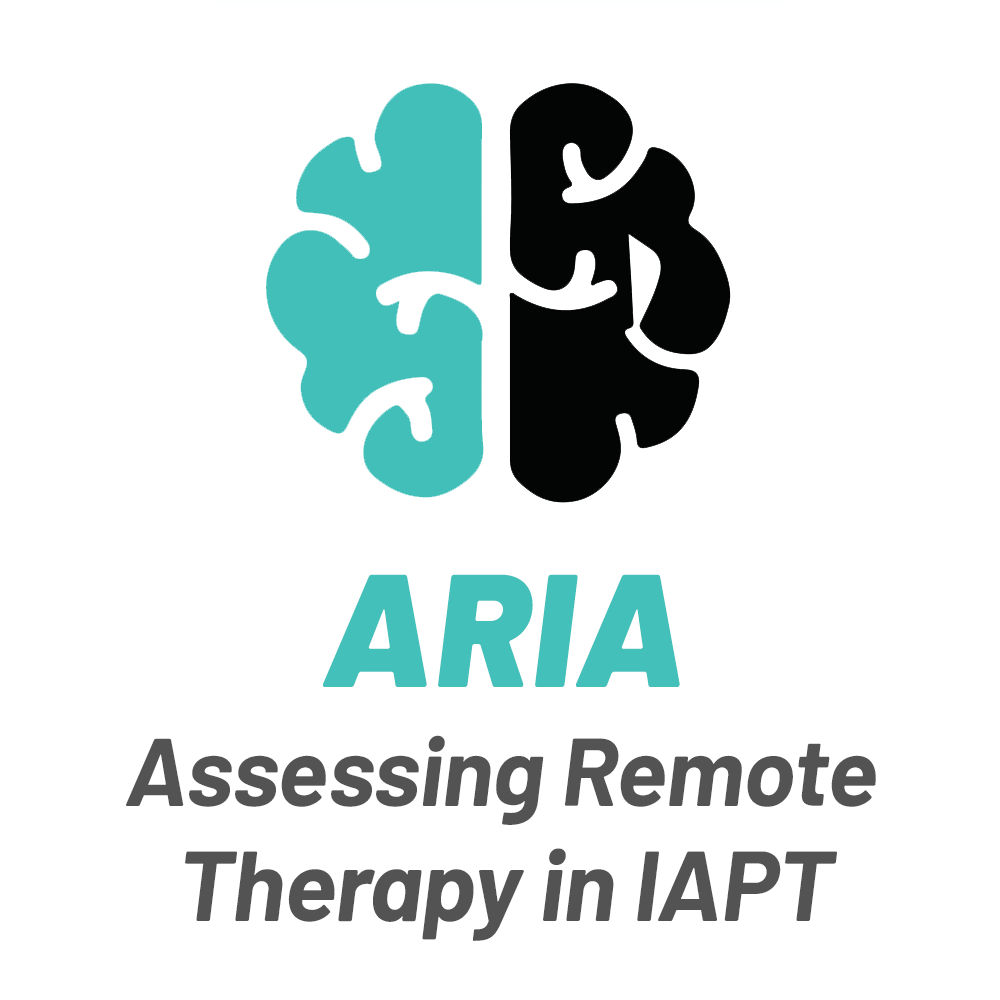ARIA
study name
ARIA - Assessing Remote Therapy in IAPT (Improving Access to Psychological Therapies)
ARIA study explores the effectiveness of remote therapy delivered within IAPT Services in Greater Manchester during COVID-19.
Study Population
- Patients who attended at least one session of remote therapy provided by IAPT services during Covid-19 (between March 2020 – November 2020) and patients who received face-to-face treatment for 1 year pre-COVID (between March 2019 – March 2020).
- Data from 5155 patients were analysed in the remote therapy group and from 9199 patients in the face-to-face group.
ARIA Study Design
- ARIA is a retrospective, cross-sectional, benchmark comparison of remote therapy across four IAPT services in Greater Manchester.
- Routinely collected data from patients accessing IAPT services were analysed.
- To compare the outcomes of remote therapy versus face-to-face therapy, remote treatment scores were compared with treatment scores of patients who received face-to-face treatment before COVID.
Info Tabs

- There was an evident impact of COVID-19 on access to IAPT services; with a significant decrease in referrals in comparison to 2019, government-imposed restrictions and the reduced capacity of face-to-face appointments.
- IAPT published guidance on the delivery of remote therapy treatment, and preliminary evidence suggests that this can offer positive outcomes but little is known about its effectiveness during COVID-19.

The ARIA study aimed to explore and describe the effects of remotely delivered therapies across four IAPT services in Greater Manchester.
The study evaluated:
-
- The characteristics of patients who received remote therapy delivery within IAPT services during covid-19, and of those who underwent in-person therapy (before lockdown).
- The effect of remotely deliveredtherapy (during covid-19) on anxiety and depression symptoms, and treatment outcomes, compared to face-to-face delivery (pre-covid-19).

This research provides evidence of the effectiveness of remote therapy as a treatment modality for delivering psychological therapy. This may help widen patient access to and engagement with psychological services.

- Remote therapy did not impact on service provision, with the number of sessions offered and attended being similar to those prior to COVID-19.Patients who received remote therapy experienced significantly reduced symptoms of anxiety and depression, as measured by the Generalised Anxiety Disorder-7 and PHQ-9 questionnaires respectively, over time. To note, in the remote therapy group, anxiety symptoms decreased at a rate of 1.49 units on the GAD-7 per month while depression symptoms decreased at a rate of 1.58 unit on the PHQ-9 per month. If this trend was consistent, patients receiving remote therapy would on average need less time (16 and 15 weeks) to cross the clinical cut-off scores for anxiety and depression respectively, compared to face-to-face treatment (28 and 24 weeks).
- The median number of sessions patients received was 2 however clinically important differences in anxiety and depression scores were found to only occur after 4-6 treatment sessions. This indicates that changes clinical improvement appeared to be slow and patients may not have received an adequate length of therapy to reach the desired clinical cut-offs.
- Overall, remote therapy was associated with a significant decrease in symptoms of anxiety and depression and with a more rapid decrease in symptom change in comparison to face-to-face treatment.
- Background
-

- There was an evident impact of COVID-19 on access to IAPT services; with a significant decrease in referrals in comparison to 2019, government-imposed restrictions and the reduced capacity of face-to-face appointments.
- IAPT published guidance on the delivery of remote therapy treatment, and preliminary evidence suggests that this can offer positive outcomes but little is known about its effectiveness during COVID-19.
- Study aims
-

The ARIA study aimed to explore and describe the effects of remotely delivered therapies across four IAPT services in Greater Manchester.
The study evaluated:
-
- The characteristics of patients who received remote therapy delivery within IAPT services during covid-19, and of those who underwent in-person therapy (before lockdown).
- The effect of remotely deliveredtherapy (during covid-19) on anxiety and depression symptoms, and treatment outcomes, compared to face-to-face delivery (pre-covid-19).
-
- Importance of research
-

This research provides evidence of the effectiveness of remote therapy as a treatment modality for delivering psychological therapy. This may help widen patient access to and engagement with psychological services.
- Findings
-

- Remote therapy did not impact on service provision, with the number of sessions offered and attended being similar to those prior to COVID-19.Patients who received remote therapy experienced significantly reduced symptoms of anxiety and depression, as measured by the Generalised Anxiety Disorder-7 and PHQ-9 questionnaires respectively, over time. To note, in the remote therapy group, anxiety symptoms decreased at a rate of 1.49 units on the GAD-7 per month while depression symptoms decreased at a rate of 1.58 unit on the PHQ-9 per month. If this trend was consistent, patients receiving remote therapy would on average need less time (16 and 15 weeks) to cross the clinical cut-off scores for anxiety and depression respectively, compared to face-to-face treatment (28 and 24 weeks).
- The median number of sessions patients received was 2 however clinically important differences in anxiety and depression scores were found to only occur after 4-6 treatment sessions. This indicates that changes clinical improvement appeared to be slow and patients may not have received an adequate length of therapy to reach the desired clinical cut-offs.
- Overall, remote therapy was associated with a significant decrease in symptoms of anxiety and depression and with a more rapid decrease in symptom change in comparison to face-to-face treatment.




